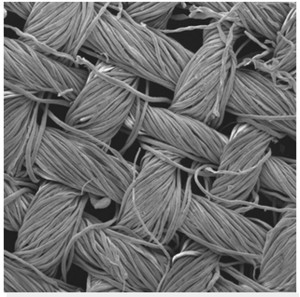
Australian researchers have developed an inexpensive and efficient new way to grow nanostructures on textiles that can degrade organic matter when exposed to light. The work paves the way toward nano-enhanced textiles that can spontaneously clean themselves of stains and grime simply by being put under a light bulb or worn in sunlight.
Rajesh Ramanathan, research fellow at Melbourne’s RMIT University, said the process developed by the team offers a variety of applications for such catalysis-based industries as agrochemicals, pharmaceuticals and natural products, and could be easily scaled up to industrial levels. “The advantage of textiles is they already have a 3D structure so they are great at absorbing light, which in turn speeds up the process of degrading organic matter,” he said.
The researchers at the Ian Potter NanoBioSensing Facility and NanoBiotechnology Research Lab at RMIT worked with copper and silver-based nanostructures, which are known for their ability to absorb visible light; when the nanostructures are exposed to light, they receive an energy boost that creates “hot electrons” that release a burst of energy that enables the nanostructures to degrade organic matter.
The challenge for researchers has been to work out how to build these nanostructures on an industrial scale and permanently attach them to textiles. The RMIT team’s novel approach was to grow the nanostructures directly onto the textiles by dipping them into a few solutions, resulting in the development of stable nanostructures within 30 minutes.
When exposed to light, it took less than six minutes for some of the nano-enhanced textiles to spontaneously clean themselves.
“Our next step will be to test our nano-enhanced textiles with organic compounds that could be more relevant to consumers, to see how quickly they can handle common stains like tomato sauce or wine,” Ramanathan said.
 TEXTILES.ORG
TEXTILES.ORG


